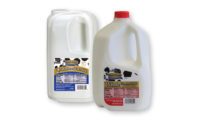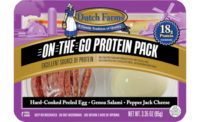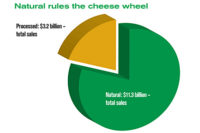The Chicago-based Dutch Farms recently won a 2013 Illinois Export Award — New Exporter of the Year — being recognized for a side of its business that’s been growing dramatically. In the last two to three years, the company said it has seen growth over 65% for its export business.
In announcing the award, the Illinois governor’s office noted that Dutch Farms’ annual export sales are over $1 million, and that Illinois is the largest exporting state in the Midwest and the fifth largest in the United States.
In addition to the export side of the business, Dutch Farms distributes dairy products in 36 states. Although the company does not manufacture cheese itself, it works with several manufacturers throughout the United States (mainly in the Midwest) to produce and co-pack its products. The company’s primary domestic customer is grocery stores.
So what’s helping to drive the export growth?
“Ex-pats and foreign consumers are demanding American food products abroad,” said Karen Van Prooyen, director of marketing. “We have found we often have to help educate foreign populations on flavor profiles and recipes. For example, cheese is an unusual food for many, many cultures across the globe.”
She explained further: “We are developing a program to help foreign consumers identify ‘how’ one might eat cheese. For example, we need to first educate our Chinese consumers on what a taco is, before selling them shredded cheese. We are accomplishing this goal through sampling and the dissemination of recipe cards.”
The majority of the product being exported is cheese, according to Van Prooyen. The type of cheese the company is exporting includes natural shreds, bars and slices, and processed cheese including American singles, cream cheese and string cheese.
As for who’s buying the cheese, the company is mostly selling its dairy products/cheese to foreign brokers, according to Van Prooyen. The company, which is a member of the Food Export Association, currently exports to Puerto Rico, China, South Korea, Mexico, Panama, Columbia, Honduras, South Africa and more.
Van Prooyen emphasized the importance of good partnerships for its continued export success.
“There are a variety of trade regulations and labeling guidelines that need to be navigated very carefully,” she said. “This is where good partnerships are so very critical. We need to make sure nothing is lost in translation and that our customer’s trade needs are delivered on expertly. Our foreign partners are looking to only partner with the most experienced, trusted, honest foreign partners.”
According to Van Prooyen, export/foreign trade is one of the aspects of the company’s business which represents tremendous opportunities for growth, and the company will continue to build on that.
“We are aggressively marketing American-made dairy products abroad. We are working with the State of Illinois to find additional opportunities with a number of foreign partners,” said Kevin Devries, vice president. “We are proud to share world-renowned dairy products from America’s heartland to countries as far away as South Korea, China, South Africa, the Caribbean and Central America.”
Cheese drives the business
The Dutch Farms brand features over 250 SKUs including cheese in all varieties, yogurt, other cultured products, butter, eggs and juice. The company’s cheese products include: natural slices, bars and shreds; string cheese, processed cheese, cream cheese, spreadable “pub” cheese, snack cheese wedges, parmesan cheese, feta, gorgonzola, blue cheeses; and its new premium Deli Reserve cheese slices.
Dutch Farms is represented in nearly every dairy category found in the grocery store, according to Van Prooyen. “[But], arguably cheese and eggs are the leaders,” she said. “Among dairy SKUs cheese is among the highest-volume items sold at the retail level.”
The company recently introduced its Deli Reserve cheese brand. The new line extension features aged, premium, all-natural cheese found in the deli grab n’ go case, as well as behind the deli counter (sliced to order). The natural slices are packaged in new rigid packs which are re-closable and durable. The cheese is available in Gouda, New York extra-sharp, baby Swiss, provolone, Muenster and American. The new cheese was featured at this year’s International Dairy-Deli-Bakery Association Show in Orlando in June.
A Midwest brand
Cornelius Boomsma started the family business in 1929, as a local produce distributor on Chicago’s South Side. The early days consisted of mostly selling produce and the business quickly grew into Boomsma Wholesale Eggs. For the next fifty years or so, the egg business flourished. Soon, larger refrigerated warehouse space was needed as the demand for farm-fresh dairy products had expanded into Iowa, Minnesota and Missouri.
Dutch Farms, which is now fourth-generation family-owned, was officially established in 1987 by two of Boomsma’s sons. In the 1990s, the company moved to its current facility in Chicago. It began delivering farm-fresh cheese, dairy, meat and deli products throughout the United States.
“The Midwest is our home. All growth starts from there and moves outward,” said Van Prooyen.
She said the company also looks at itself as a Chicago brand and its products can be found in the “stores of the community.”
“Chicago is a very interesting grocery market. It is one of the largest independent grocer communities in the country (over 700 stores). We distribute product to nearly all of them,” said Van Prooyen.
The company’s target market is largely female with children in the household. Van Prooyen described much of its market as “Pinterest moms” which, as she explained it, is a budget-conscious consumer who still wants to feed their families “good food.” This means making economical recipes, and one of the most popular places these days to find family-tested recipes is Pinterest, she said.
Besides the export side, Van Prooyen said the company is looking for continued growth by developing its national distribution and product innovation.
“The Dutch are known for making superior dairy products. We are proud of our heritage and this is reflected in [our] products,” said Van Prooyen.






